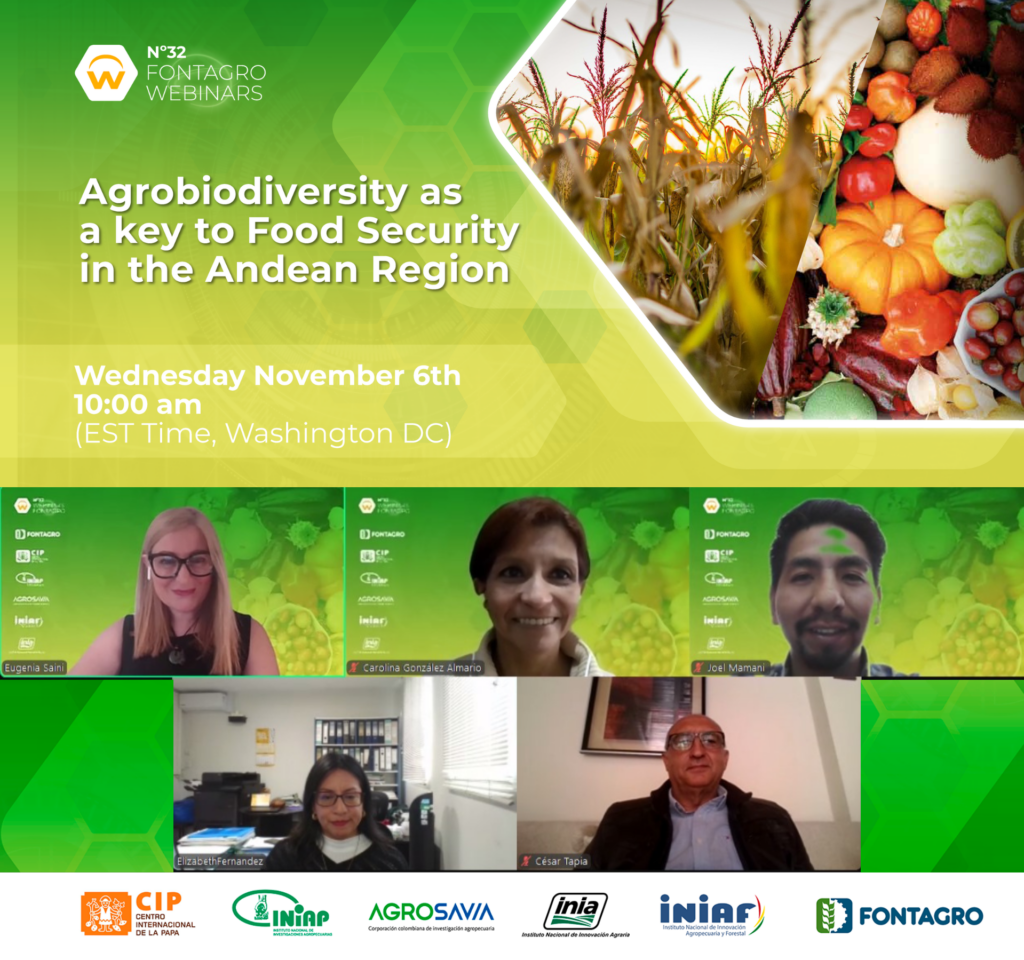
On November 6th, an exceptional webinar was held by FONTAGRO in collaboration with the National Institute of Agricultural Research of Ecuador (INIAP), the Colombian Agricultural Research Corporation (AGROSAVIA), the National Institute of Agrarian Innovation of Peru (INIA), and the National Institute of Agricultural and Forestry Innovation of Bolivia (INIAF). The event aimed to highlight achievements in agrobiodiversity in the Andean Region and its application in improving nutrition and food security.
The webinar showcased successful cases in research, extension, and technology transfer, emphasizing valuable contributions from various countries in the region. Celebrated researchers shared success stories that evidenced the importance of cooperation and knowledge exchange in tackling current challenges in food security and sustainability.
According to expert presentations, agrobiodiversity is essential not only for current food resilience but also as a key to addressing future challenges in food production. In countries like Bolivia, Colombia, Ecuador, and Peru, the conservation and promotion of agrobiodiversity have proven to be vital for local food security.
Investing in both in situ and ex situ conservation strategies is crucial for strengthening food security. Communities that actively participate in seed banks and local variety conservation are better prepared to face climate-related adversities. Additionally, the traditional knowledge of Indigenous communities is recognized as invaluable for the sustainable management of agrobiodiversity in the Andes.
International cooperation initiatives are essential to enhance local efforts in conserving agrobiodiversity and improving food sovereignty. On-farm biodiversity has proven to be a key factor in strengthening ecosystem services and improving the quality of life of Andean communities.
In conclusion, promoting agrobiodiversity is not only a path to food security in the Andean region but also a step toward the well-being of Indigenous communities and long-term sustainability. Communities, governments, and international organizations must come together to strengthen these efforts and ensure a safer, more sustainable food future.
The event also aligned with the objectives set at COP16 and other international forums dedicated to biodiversity protection and the promotion of sustainable food practices. These initiatives are expected not only to strengthen the resilience of agri-food systems in the region but also to improve the quality of life for local communities.
To view the recording of this event, visit: https://www.youtube.com/live/zguG9ZEwWvc?si=X6wkx9dLwIXoVpLk
***
About FONTAGRO
FONTAGRO was created 1998 with the purpose of promoting the increase of the competitiveness of the agri-food sector, ensuring the sustainable management of natural resources and the reduction of poverty in the region. The objective of FONTAGRO is to establish itself as a sustainable financing mechanism for the development of agricultural technology and innovation in Latin America and the Caribbean and Spain, and to establish a forum for the discussion of priority topics of technological innovation. The member countries are: Argentina, Bolivia, Chile, Colombia, Costa Rica, Ecuador, Spain, Honduras, Nicaragua, Panama, Paraguay, Peru, Dominican Republic, Uruguay and Venezuela. In the last 27 years 204 regional agricultural innovation platforms have been co-financed for an amount of US $ 150.7 million, which has reached 531 institutions and 35 countries worldwide.
